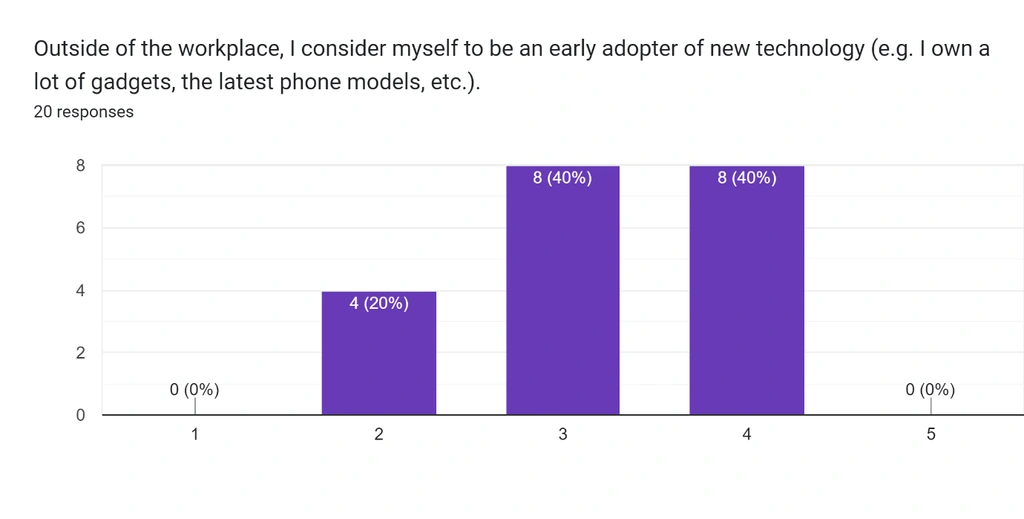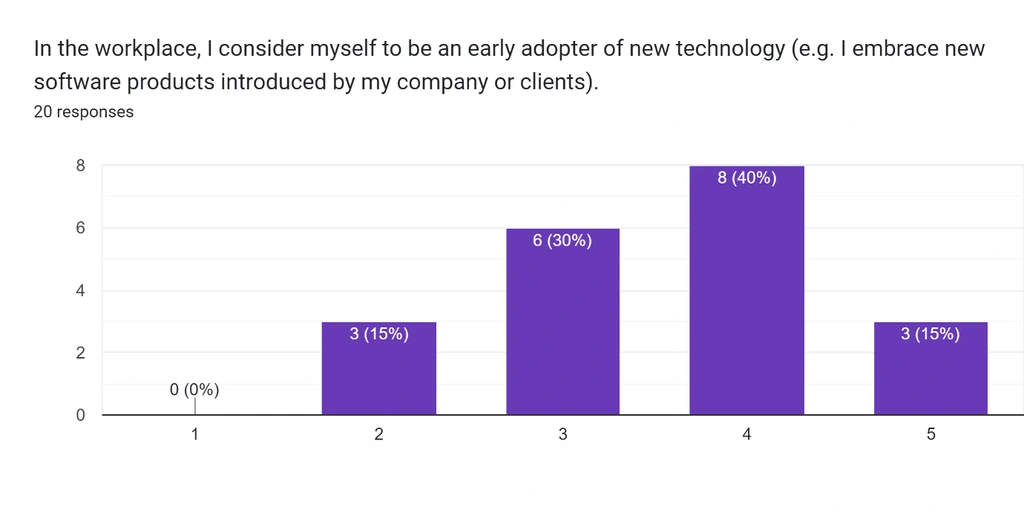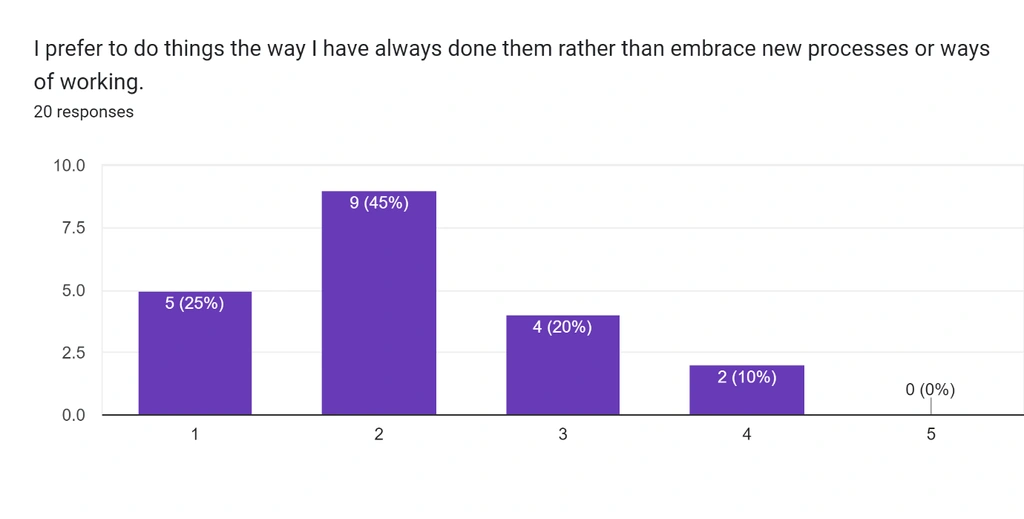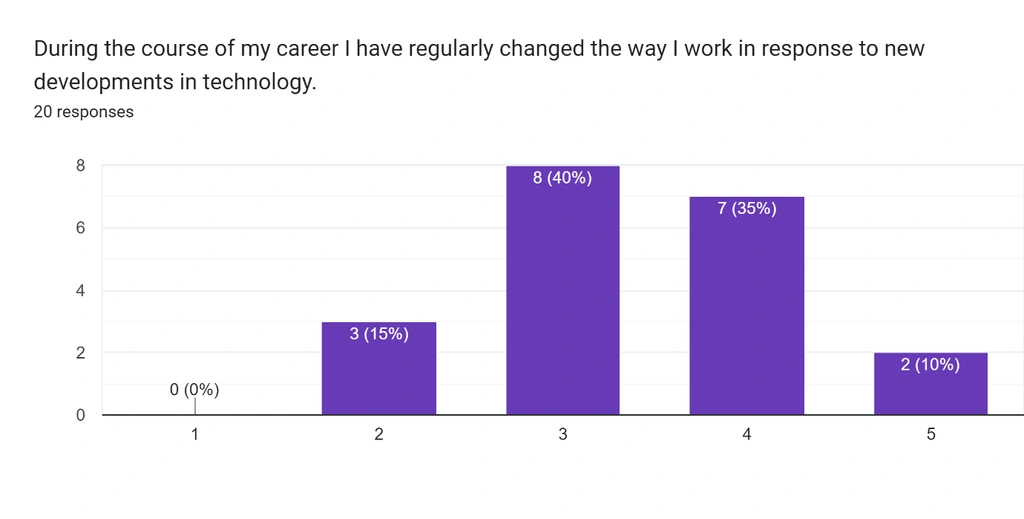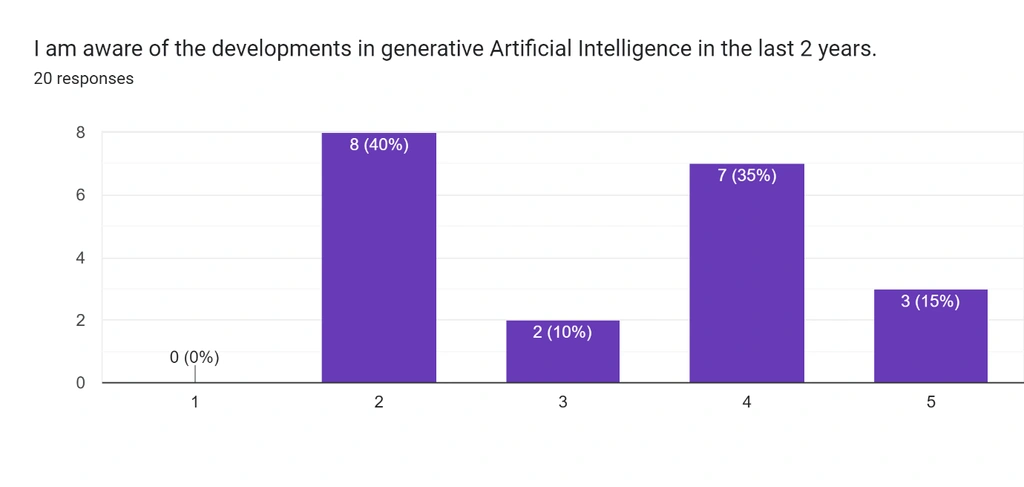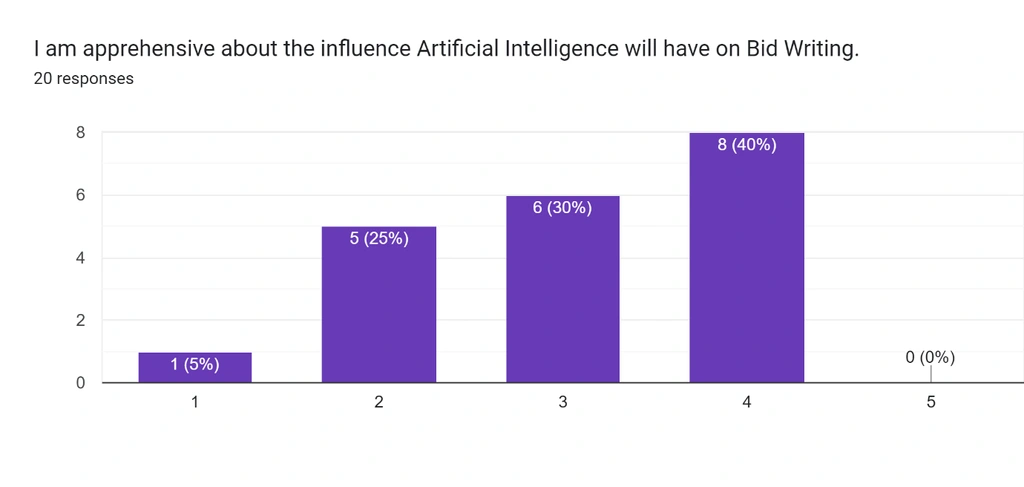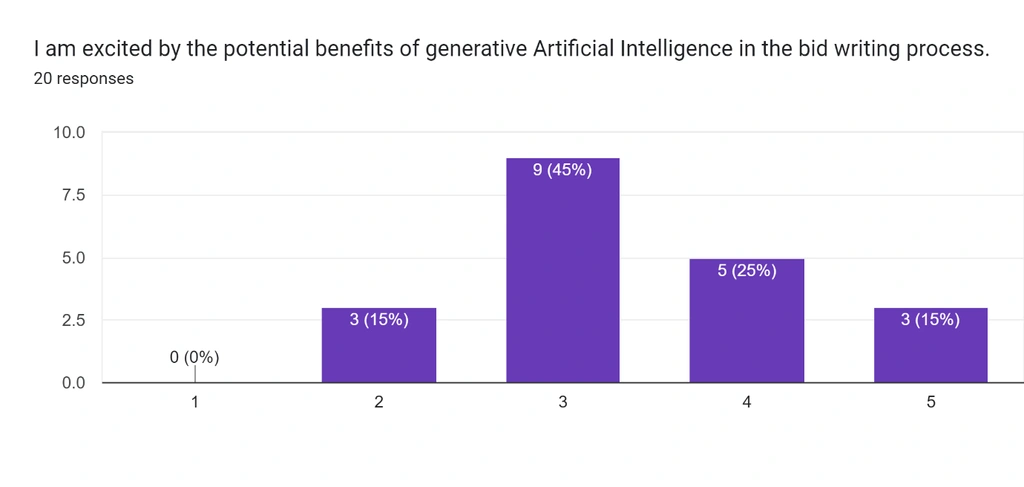Are bid writers and managers ready to embrace new technologies? In the near future, bid writers early to adopt and become proficient in AI will be highly valuable employees and consultants. This article explores AutogenAI's recently conducted survey of bid writers and managers, in which we assessed their attitudes towards AI, technological change and workplace innovation. In today's digital age, technology has become an integral part of the bid writing process.
In early 2020, when AutogenAI founder Sean Williams mentioned that he planned to use AI to automate bid writing, I thought he was joking. This was impossible, surely? I was in the midst of a highly complex multimillion central government tender, working alongside a team of solution designers, finance specialists and operational leads, and I could not conceive of technology that could aggregate the information needed for a successful bid.
18 months later, Sean posted on LinkedIn about the potential of AI in bid writing. Only, Sean did not author the post – as the final line revealed, it was written entirely by AI. I was astounded, and a little disturbed. I had always thought my profession to be future-proof.
AutogenAI was soon founded and, while intrigued, I remained sceptical. After all, it is one thing to pen a neat LinkedIn post – quite another to produce a compelling bid response. So, when Sean sought to recruit bid writers to join the project, I was torn. Would I be digging my own grave?
I have now been at AutogenAI for six months. Working alongside Machine Learning specialists, developers and fellow bid writers to develop a product that channels the power of AI to speed up the bid writing process. I have been regularly astonished at its awesome power to create in a fraction of the time a human would take.
And yet – bid writing as a profession will remain. You cannot (yet) produce a compelling tender with all its various nuances in a few clicks. What you can do, however, is speed up the tasks that make bid writing such a lengthy and arduous process.
You can generate good ideas and examples at the click of a button – but you need the expertise to ask the right question in the first place. You can turn those ideas into good first drafts – but you need the skills to hone text into a great winning response. You can improve your grammar, translate your text, expand, compress and incorporate statistics – but you need experience to combine these elements to form one cohesive whole.
From a business perspective, this means that more bids can be produced more quickly, increasing the number of opportunities an organisation can bid for with the same staff and resources. From a bid writers’ perspective, the job becomes more fun, more creative and less stressful.
I’ve worked on the AI – but it has also worked on me. My interests have broadened – instead of history books and articles, I’m more attracted to forward looking news and content. Instead of working alone in a darkened room, I now collaborate with some of the cleverest people I’ve ever met. I now find it hard to imagine standing outside of the AI fence looking in: I expect I would know very little. I would have remained working comfortably – while pretty ignorant of AI and how it can enhance our profession.
Ultimately, no matter where you land on the issue, there is no holding back the tide – bids will be produced using AI. Bid writers who get on board and master the tech now will be the most sought after employees and consultants in the near future. But in these early days, attitudes to the new technology are crucial. AutogenAI has launched a survey of bid writers and managers to assess their attitudes to: AI, technological change and workplace innovation. Bid professionals are asked to rate a series of statements on a 1-5 scale with 1 being strongly disagree and 5 being strongly agree. The survey has been advertised on LinkedIn and will remain open so we can compare attitudes and results over time. The initial results are varied and interesting.
Early adoption of technology
To my surprise, only 20% of respondents did not consider themselves early adopters of new technology outside the workplace, while 40% said they did.
Unsurprisingly, willingness to adopt new technology was even higher in the workplace, perhaps because this willingness is vital in jobs where the adoption of technology is decided by clients or employers.
Use of specialist bid software
Despite a relatively mature Bidtech market, 75% of respondents disagreed or strongly disagreed that they use specialist software products to help with the bid process, and only 5% strongly agreed. When asked which software they used, only 5% mentioned a truly specialist package (RFPIO), while the remainder referred to donor management software (Bloomerang), writing tools (Grammarly and Hemingway) and standard MS Office (Word, Excel, Visio etc.)
Attitudes to workplace change
Somewhat surprisingly in such a process-driven profession, only 10% said that they preferred to do things the way they have always done them rather than embrace new processes or ways of working: 45% disagreed and 25% strongly disagreed. Moreover, 45% agreed or strongly agreed that they have regularly changed the way they work during their career (90% of respondents have been bid writers for more than 10 years), and only 15% said they had not.
Awareness of and attitude towards developments in generative AI
When it came to awareness of recent developments in generative AI, 50% either agreed or strongly agreed that they are aware of them; 40% disagreed and no one strongly disagreed. One wonders what the results would have been just a few months ago.
In terms of attitudes towards AI, 40% admitted to being apprehensive about the influence AI will have on bid writing, while 30% were ambivalent, and 30% stated that they were not apprehensive.
The same percentage said they are excited about the influence AI will have on bid writing: 15% strongly agreed and 25% agreed, and just 15% disagreed. 45% of respondents were ambivalent.
Reasons for apprehension were interesting. Respondents were far more concerned about a reduction in the quality of tenders (65%), unrealistic productivity expectations from senior managers and clients (40%) and commissioners frowning upon AI produced content (25%) than about AI taking their job (5%).
Respondent comments showed some scepticism about whether AI could work in this context at all. One argued that “there are too many factors to producing winning bids”, whilst another stated that “AI has limitations and can’t do everything a good bid writer does”, and a third voiced concern that AI may lead to “laziness in the process leading to lookalike responses” and reduced creativity and originality in tenders. There was also uncertainty about how bid writers would need to adapt and change their approach to writing bids in the face of such technology.
Reasons for excitement were less varied with fewer respondents adding their own responses. Unsurprisingly from a profession used to long and often unsocial hours, the potential to speed up the bid writing process was a popular choice (60%). One respondent said they were excited about “anything to speed up the process”. Next was the ability to automatically scan previous bid documents for the most relevant information and cross-checking results against tender documentation (both 55%). Automatic structuring of responses was chosen by 40%, and automatic checking for inconsistencies was selected by 25%.
Conclusion
The majority of respondents were interested in exploring AI-based solutions to improve their bid writing process, and felt that AI could help them save time. Respondents also saw the potential for AI to free up resources and increase efficiency.
The survey showed that bid writers are aware of the need to stay informed on emerging technologies, and positive about the potential impact of AI on their work. Many felt that AI could provide valuable insights into data and improve the accuracy of bids, whilst others saw its potential to automate tedious tasks and reduce workloads.
At the same time, there was some hesitation around the implications of AI on bid writing. Some respondents were worried that AI could produce generic responses or be seen as a replacement for human creativity. Others raised concerns that use of the technology may be viewed negatively by commissioners.
As we have seen, the survey has thus far revealed that bid writers are generally open to embracing new technologies and approaches including AI. But what do you think? To complete the survey, please click this link.
—
If you’re a bid writer or business development professional and excited (or fearful) about recent developments in AI, AutogenAI are holding a series of events to get everyone geared up for the changes coming to our profession; we are also recruiting for a range of roles suited to former and current bid writers. If you would like to hear more about either – please register your interest at info@autogenai.com.


